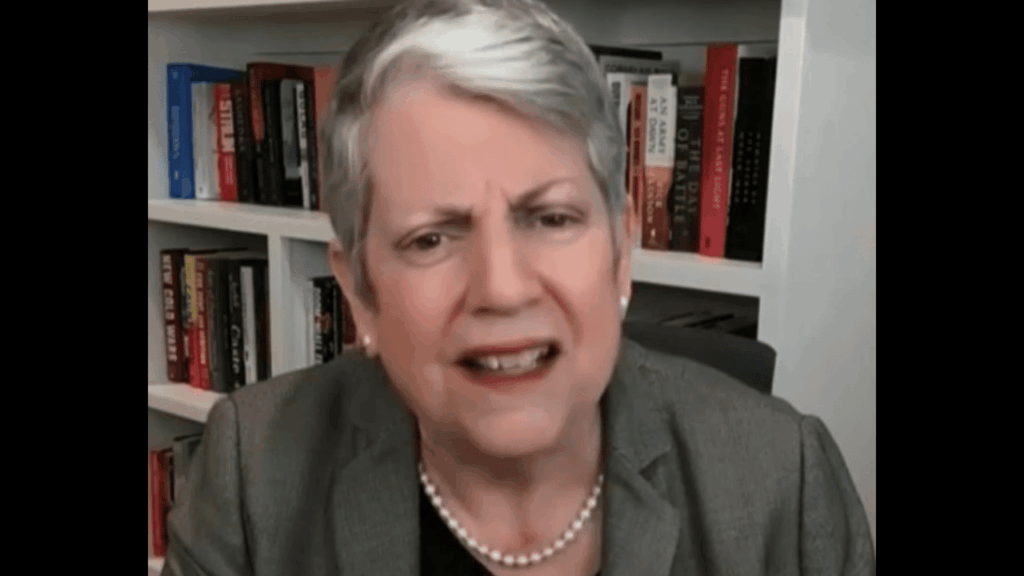Former DHS Secretary Janet Napolitano appeared on MSNBC to criticize President Trump’s deportation and National Guard efforts, calling them — in her words — “problematic on any number of reasons.”
Her remarks reflect a selective view of immigration enforcement that downplays the federal government’s authority and responsibility.
Napolitano said:
“The mass deportation initiative that the administration has undertaken — it’s not focusing on the worst of the worst, those with other criminal violations in addition to being in the country illegally. It’s way broader than that.”
Napolitano suggests immigration enforcement should focus solely on undocumented immigrants with additional criminal convictions, disregarding that unlawful presence itself violates federal immigration law. Entering the U.S. without authorization is a misdemeanor under 8 U.S.C. § 1325, while reentering after removal is a felony under 8 U.S.C. § 1326. Visa overstays, though typically civil violations, still render individuals subject to deportation under the Immigration and Nationality Act. Enforcing these laws uniformly isn’t “too broad” — it’s the executive branch’s duty to execute the statutes Congress enacted.
She continued:
“And of course, it’s focusing on cities that don’t align with the president’s positions and also cities that have high immigrant populations. Immigrants who are here legally, people who are citizens, and then of course those who are undocumented.”
Here, Napolitano implies Trump is targeting liberal or immigrant-heavy cities, echoing claims made by sanctuary-city mayors who limit cooperation with Immigration and Customs Enforcement (ICE). While some cities have adopted policies restricting local law enforcement from assisting ICE (e.g., California’s SB 54), they cannot legally block federal immigration enforcement. Napolitano’s framing sidesteps the fact that ICE operates under federal authority, and non-cooperation by local governments doesn’t exempt them from federal law. Her suggestion that legal immigrants or citizens are being targeted lacks evidence, as ICE’s mandate focuses on undocumented individuals.
Napolitano added:
“There’s a way to do this that’s intelligent and in accord with law. But this is just, uh, so broad and, and such a Bigfoot on the problem that it’s actually exacerbating tensions.”
Calling Trump’s approach a “Bigfoot” move reveals a disconnect. Enforcing immigration laws and securing the border are core federal responsibilities tied to national security, not heavy-handed overreach. Her critique seems to dismiss the federal government’s obligation to enforce laws that some local leaders oppose, while framing enforcement as unnecessarily aggressive.
Napolitano also stated:
“I actually sent the National Guard to the Arizona border back in the early 2000s — but the president didn’t come in and take command of my National Guard.”
Napolitano refers to her time as Arizona’s governor (2003–2009), when she deployed the National Guard to support border security, as did other governors. Her deployment was coordinated with federal authorities, not in defiance of them. Her comment implies Trump improperly “took command” of state National Guards, but presidents have authority to federalize the Guard for immigration enforcement or border security under Title 10 of the U.S. Code, as seen in Trump’s 2018 and later deployments. Governors can deploy their Guard for state purposes, yet federal law takes precedence when immigration enforcement — a federal responsibility — is involved.
Governors and states must comply with federal immigration law, as the Supremacy Clause (Article VI, Clause 2) establishes federal authority over state law. While states can limit how much their local law enforcement cooperates with ICE , they cannot obstruct federal operations. The Supreme Court’s ruling in Arizona v. United States (2012) affirmed that states cannot enact policies that conflict with federal immigration law.
Napolitano’s criticism of Trump’s enforcement as overly broad overlooks the federal government’s clear authority — and duty — to enforce immigration laws across all states.

